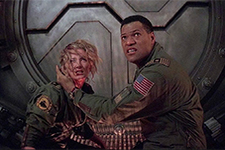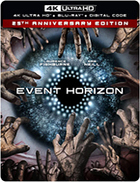Event Horizon (4K UHD)
|  Event Horizon is a calculated and, for the most part, well-executed horror film. Nearly every scene is specifically designed to elicit some kind of unpleasant feeling, whether that be jump-in-your-seat shock, gnawing fear, stomach-churning suspense, sick-to-your-stomach nausea, or just plain edgy disturbance. If this was the goal of first-time screenwriter Philip Eisner and director Paul W.S. Anderson (then known for 1994’s Mortal Kombat film), they hit the target dead-on. Make no mistake about it: Event Horizon is a scary, unsettling movie. The story takes place in the mid-21st century. Event Horizon is the name of a massive deep-space craft that disappeared while supposedly surveying the planet Neptune. Seven years later, a strange distress signal is picked up from that same area, and it is determined that it originated from the missing ship. The question is, what happened to it and where has it been for the past seven years? A band of search-and-rescue experts headed by Captain Joe Miller (Laurence Fishburne) is deployed to answer those questions. Hitching a ride with them is Dr. William Wier (Sam Neill), who was the brains behind the Event Horizon, which means he is conveniently on hand to reveal a lot of necessary exposition. He informs the stunned crew that there is more to this particular space vessel than the general public was allowed to know. In fact, it was a top-secret experiment in “folding space”—the theoretical idea of instantaneous space travel by bringing two points in space together, allowing for travel without actually moving. Once the rescue team arrives at the Event Horizon it is quickly evident that something horrible has happened, and that is before we see blood-spattered remains coating the interior walls of the control deck. Evoking the same feeling as James Cameron’s Aliens (1986) (not surprisingly, both films were shot by Adrian Biddle), the members of the search-and-rescue team enter the deserted space craft and later find themselves trapped on it. “This place is a tomb,” intones Captain Miller at one point in a moment of clear foreshadowing. You see, the Event Horizon has been some place terrible, and it seems to have brought something back with it. I won’t divulge any more of the plot specifics because a great deal of the movie’s effectiveness hinges on the slow and deliberate uncovering of exactly what happened and what the ramifications are of deying the laws of physics. Dr. Wier tries again and again to use science to explain the increasingly bizarre occurrences, but it becomes evident that something deep and mysterious is going on—something that can’t be explained away with physics and mathematical probability. In this regard, Event Horizon fits neatly into the white science/black magic dichotomy that often structures horror movies involving demonology, voodoo, and other forms of religious and spiritual dread. Science always falls short, and in this case it is coopted for nefarious purposes. In the same manner of films like Hellraiser (1987) and Jacob’s Ladder (1990), the film delves into graphically explicit imagery that evoke Renaissance paintings by Hieronymus Bosch and Pieter Bruegel. For the most part the movie stays focused and grim throughout, although there is a failed stab at humor near the end involving one determined character’s struggle to survive that very nearly derails the whole enterprise. Event Horizon is a triumph of special effects, set design, sound effects, lighting, and make-up. The cavernous sets depicting the insides of the ship were consciously designed to evoke the feelings of creepy Gothic architecture, and the enormous room that holds the thundering mechanism that makes “space folding” possible reflects nothing less than a medieval torture dungeon designed by a rabid postmodern sadist, complete with massive (and functionally pointless) spikes protruding from the walls. Anderson displays a sharp visual acuity, albeit one that borrows heavily from sources ranging from Stanley Kubrick, to Ridley Scott, to Andrei Tarkovsky and has been largely absent from his subsequent work, including multiple Resident Evil films (2002, 2012, 2016), Alien vs. Predator (2004), and Pompeii (2014). In virtually every respect, Event Horizon is a deeply unsettling movie, not just because of its themes, but out of the sheer impact of its visuals. Anderson goes for the jugular as he attempts to make everything as grotesque as possible (here he drops any pretenses of walking in the footsteps of Kubrick or Robert Wise and instead adopts the shameless visceral approach of Lucio Fulci). Of course, many respond enthusiastically to this kind of horror, and in that sense the film really works. However, while I cannot deny Event Horizon’s impact and its technical achievements, I cannot say I took anything meaningful from it. The first hour, with its quick, calculating scares, dark corridors, suspenseful build-up, and sci-fi mumbo-jumbo was actually quite enthralling. But, after that, Event Horizon became so intense and so horrific with no underlying purpose (not to mention becoming logically disjointed), that it becomes hard to justify its own shock tactics beyond their own effectiveness.
Copyright © 2022 James Kendrick Thoughts? E-mail James Kendrick All images copyright © Paramount Home Entertainment | |||||||||||||||||||||||||||||
Overall Rating: 

 (3)
(3)


